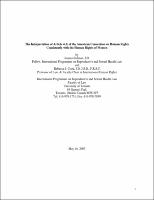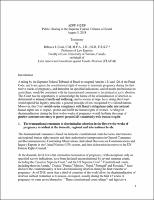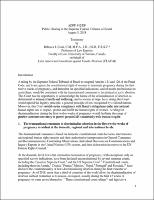Mostrar el registro sencillo del ítem
The Interpretation of Article 4(1) of the American Convention on Human Rights Consistently with the Human Rights of Women by Joanna Erdman, J.D. Fellow, International Programme on Reproductive and Sexual Health Law and Rebecca J. Cook, J.D. J.S.D., F.R.S.C. Professor of Law, & Faculty Chair in International Human Rights International Programme on Reproductive and Sexual Health Law Faculty of Law University of Toronto
| dc.date.accessioned | 2023-05-15T15:38:45Z | |
| dc.date.available | 2023-05-15T15:38:45Z | |
| dc.date.issued | 2005 | |
| dc.identifier.uri | http://clacaidigital.info/handle/123456789/1929 | |
| dc.description.abstract | The World Health Organization (WHO) estimates that each year almost 4 million unsafe abortions are performed in Latin America.1 Each year, thousands of Latin American women die from complications related to unsafe abortions, accounting for 17% of all maternal deaths in the region.2 Unsafe abortion is the second leading cause of maternal mortality in Colombia.3 Many more women in Colombia specifically and in Latin America generally suffer chronic health complications, including sepsis, pelvic trauma, and sterility. Moreover, women are often unwilling to risk prosecution to obtain post-abortion care. The Colombian Penal Code, Article 343, defines abortion as a crime against life and personal integrity and prohibits it without exception.4 Abortion is even criminalized in cases where a woman has become pregnant as the result of rape. Despite these strict criminal provisions, some 450,000 abortions are performed annually in Colombia. Criminal laws do not restrict access to abortion. They only prohibit access to safe abortion. | es_ES |
| dc.language.iso | en | es_ES |
| dc.title | The Interpretation of Article 4(1) of the American Convention on Human Rights Consistently with the Human Rights of Women by Joanna Erdman, J.D. Fellow, International Programme on Reproductive and Sexual Health Law and Rebecca J. Cook, J.D. J.S.D., F.R.S.C. Professor of Law, & Faculty Chair in International Human Rights International Programme on Reproductive and Sexual Health Law Faculty of Law University of Toronto | es_ES |
| dc.type | Other | es_ES |
Ficheros en el ítem
Este ítem aparece en la(s) siguiente(s) colección(ones)
-
Artículos académicos [299]



